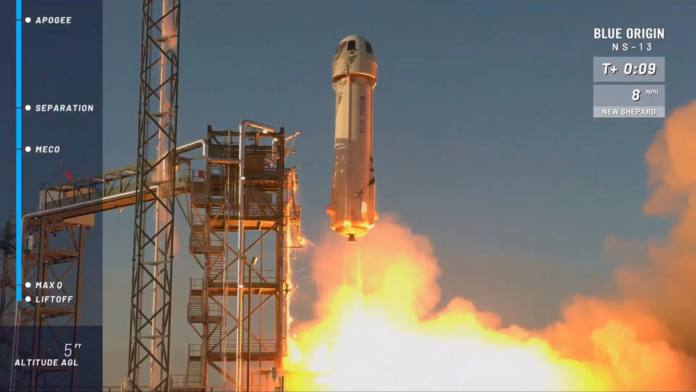By Seth Gellman
Source: Blue Origin, NYT
Blue Origin, a rocket venture owned by Jeff Bezos, launched its space tourism rocket to the edge of Earth’s atmosphere on October 13 for the first time in over a year. The launch marked the 13th test flight of the rocket named New Shepard. However, no humans have been on board during these tests. They have been run with a dummy named Mannequin Skywalker, which is a Star Wars reference.
Blue Origin’s goal is to eventually send customers on joy rides to the edge of space, but neither prices nor dates have been announced. Another one of Bezos’ ambitions is to build a moon lander for NASA astronauts, making it possible for millions to live in space. Despite their lack of test flights, CEO Bob Smith says the company is “very close” to being able to transport humans.
Three years ago, Bezos said that he would sell one billion dollars in Amazon stock every year to fund Blue Origin.
Even though there were no humans on the New Shepard, the ship was not empty. It was carrying over 100 payloads from private companies. According to Smith, the company makes millions of dollars on each flight, compared to no revenue just a few years ago.
Richard Branson’s Virgin Galactic competes with Blue Origin. Like Blue Origin, Virgin Galactic is still in the experimental stage. However, Virgin Galactic has two pilots, so it has carried people to space. The company hopes to transport live passengers next year.
New Shepard consists of two parts: a small dome shaped capsule with rectangular windows, and a 60 foot tall rocket booster that can make the capsule go up to three times the speed of sound. The capsule detaches from the rocket near the top of its flight path, suspending for a few minutes before parachuting back to Earth.
Not only was this mission to test space tourism, but also to experiment with technology for NASA. One experiment involved putting a sensor on the rocket booster’s exterior to increase the precision of lunar landings.
Blue Origin and Virgin Galactic are two of the first companies to compete for space tourism. However, competition is likely. Space tourism has the potential to make trillions of dollars, and it provides research opportunities for NASA and other scientists. There will likely be another space race, but instead of landing on the Moon, this one will involve colonizing it, which will commence a new chapter of human history.

